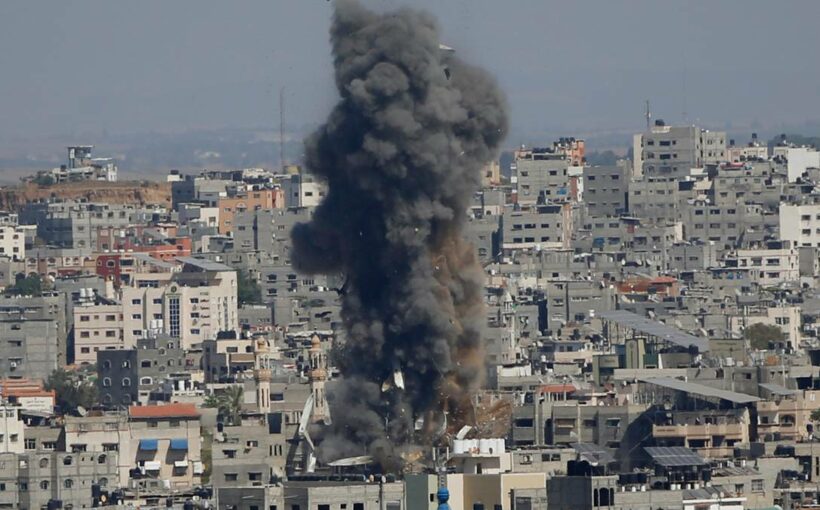There has been a dramatic escalation in the Middle East this morning, with Israel announcing its air and ground troops had launched an offensive in the Gaza Strip.
This morning, the Israel Defence Force (IDF) posted a short tweet, declaring: “IDF air and ground troops are currently attacking in the Gaza Strip.”
However, the wording of the announcement has caused widespread confusion, with the Israeli army later clarifying it had not actually physically entered the Gaza Strip – although ground troops positioned at the border have been carrying out artillery and air strikes in the north.
Witnesses have also said on social media they had not seen troops on the ground in the Gaza Strip.
The Times of Israel further explained that while some IDF troops were positioned in an enclave technically within Gaza territory, these were parts already under Israeli control, meaning such a “placement does not reasonably represent a ground invasion”.
This morning’s revelation came after Israel’s military struck more than 750 Hamas targets this week alone, following the launch of the so-called Operation Guardians of the Walls on Monday.
According to the Jerusalem Post, 60 Hamas operatives – including senior commanders – have been killed by Israeli strikes over the past five days.
At least seven people have been killed in Israel, including a 5-year-old boy.
Following this morning’s assault, it was reported that a 60-year-old Israeli man had been seriously injured by shrapnel from a rocket fired from Gaza on Ashkelon in Israel.
Overnight, Israel peppered Gaza and sent additional troops to the border, with Palestinians firing rockets back in return and sending the death toll soaring north of 100.
“Tonight we started destroying government targets in the Gaza Strip, such as central banks and internal security buildings. Hamas is beginning to discover cracks and there is pressure in the organisation, even among the Gaza public who is losing its patience and sees these ruins on the eve of the [Eid al-Fitr] holiday,” IDF spokesman Hidai Zilberman told reporters, according to the Jerusalem Post.
The latest development sparked riots between Jews and Arabs in the region, with projectiles also fired on Israel from Lebanon.
The severe escalation comes after Israeli Prime Minister Benjamin Netanyahu was presented with plans regarding a ground offensive, with the military previously stating it would not rule out an invasion.
In a statement released soon after the incursion started, Netanyahu warned of a “heavy price” to come.
“I said that we would charge a very heavy price from Hamas and the rest of the terrorist organisations,” he said.
“We are doing this and we will continue to do so with great force. The last word was not said and this operation will continue as long as it takes to restore peace and security to the State of Israel.”
Earlier this week, Netanyahu said riots and violence between everyday Arabs and Jews was “unacceptable”.
“Nothing justifies the lynching of Jews by Arabs, and nothing justifies the lynching of Arabs by Jews,” he said before the offensive.
The New York Times is reporting horrifying warnings that a “civil war” could soon erupt as opposing sides clash in Israel’s streets.
The publication also reports it is not yet clear if the latest incursion “was a full-fledged invasion or an effort to attack militant strongholds”.
However, shortly before the IDF’s announcement was made, Israel called up 7000 military reservists and cancelled combat troops’ leave.
An invasion by Israel in 2014 led to the deaths of more than 2000 Palestinians, with the latest action sparking fears of a new, bloody battle.
Meanwhile, US Secretary of State Antony Blinken said Washington was “deeply concerned about the violence in the streets of Israel”, and threw his support behind a United Nations Security Council meeting “early next week” on the growing crisis.
Why the violence suddenly erupted
While this morning’s concerning announcement has sparked fears of a new civil war, tensions in the region are nothing new.
In fact, conflict between Israel and Palestine has been developing since 1948 when Israel was created.
It has been described as the globe’s “most intractable conflict”, with both Muslims and Jews claiming parts of the region as their homeland.
While there have been efforts to achieve peace in the area for many decades, violent disagreements have continually broken out throughout the region’s troubled history.
And the sacred city of Jerusalem is central to the problem, given it is home to holy sites sacred to the world’s biggest religions, Judaism, Islam and Christianity.
They include the hill known to Jews as Temple Mount – the holiest site in Judaism – and to Muslims internationally as The Noble Sanctuary.
It was home to the Jewish temples of antiquity, and two Muslim holy places now stand there, the Dome of the Rock and Al-Aqsa Mosque.
Christians also regard the city as sacred. They believe it’s the place where Jesus preached, died and was resurrected.
Because of the city’s immense significance, both Israelis and Palestinians claim Jerusalem as their capital, although neither is widely recognised internationally.
The world responds
The UN Security Council will hold a virtual public meeting this Sunday to address the escalating violence between Israel and the Palestinians.
Meanwhile, reporters in the region have described “horrific” scenes unfolding, with the Independent reporter Bel Trew tweeting her concern for colleagues near to the violence.
“My colleagues in Gaza say it’s horrific right now there,” she said.
“They describe dozens, hundreds of air strikes and instances of artillery fire. They’ve moved to the lower floors but have no bomb shelters. I am extremely concerned about their safety.”
Source: Read Full Article

/cloudfront-ap-southeast-2.images.arcpublishing.com/nzme/7WREK3ST364IUZ6KDSD2XG5PMY.jpg)
/cloudfront-ap-southeast-2.images.arcpublishing.com/nzme/KGJHNHC3WO3E5F2MN756OPOQHE.jpg)
/cloudfront-ap-southeast-2.images.arcpublishing.com/nzme/JTPV4GEKDWB6CAUCMIVZVNFLMY.jpg)
/cloudfront-ap-southeast-2.images.arcpublishing.com/nzme/26JUJ37SYFZFUS7ISML3IJ25AI.jpg)
/cloudfront-ap-southeast-2.images.arcpublishing.com/nzme/QGYHZ2WUALX73C4D257X7N64ZQ.jpg)